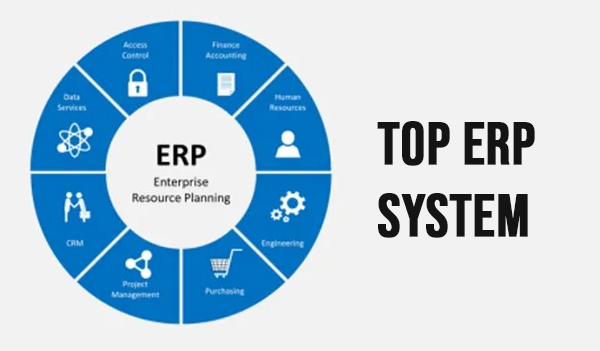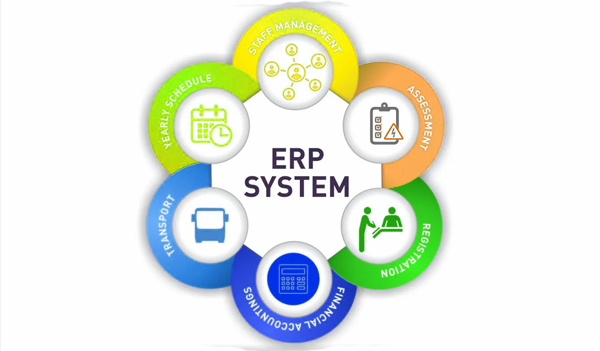Explore the dynamic landscape of business management with our comprehensive guide to the top 15 ERP systems of 2023. From industry giants like SAP ERP and Oracle NetSuite to innovative solutions like Ramco ERP and Rootstock Cloud ERP, discover the features that make these systems essential for businesses of all sizes. Dive into the world of scalability, real-time insights, and enhanced collaboration that these ERP systems offer. It’s time to set sail towards operational excellence with the best in the business!
What is an ERP System?

Sailing the Digital Seas
ERP, or Enterprise Resource Planning, is a comprehensive suite of applications designed to streamline and integrate various business processes. From managing finances and human resources to optimizing supply chain and customer relationships, an ERP system acts as the digital backbone that empowers businesses to navigate the complexities of modern operations.
Unveiling the Top 15 ERP Systems
1. SAP ERP
SAP ERP stands tall as one of the pioneers in the ERP landscape. Known for its scalability and comprehensive features, SAP ERP integrates various business functions, providing real-time insights and facilitating efficient decision-making.
2. Oracle NetSuite
Oracle NetSuite is a cloud-based ERP solution that caters to businesses of all sizes. Its unified platform includes modules for financials, inventory, and customer relationship management, making it a versatile choice for diverse industries.
3. Microsoft Dynamics 365
Microsoft Dynamics 365 offers a suite of applications that seamlessly integrate with Microsoft’s ecosystem. From Dynamics 365 Finance to Dynamics 365 Supply Chain Management, businesses can choose modules that suit their specific needs.
4. Infor ERP
Infor ERP is recognized for its industry-specific solutions. With tailored modules for manufacturing, distribution, and healthcare, Infor ERP ensures that businesses have a system that aligns precisely with their operational requirements.
5. Epicor ERP
Epicor ERP is designed for mid-sized businesses, offering modules for manufacturing, distribution, and retail. Known for its user-friendly interface, Epicor ERP streamlines processes and enhances collaboration across the organization.
6. Acumatica Cloud ERP
Acumatica Cloud ERP is a flexible and scalable solution that adapts to the evolving needs of businesses. With modules for financial management, distribution, and project accounting, Acumatica empowers businesses to grow with confidence.
7. SYSPRO ERP
SYSPRO ERP caters to manufacturers and distributors, providing a robust solution for managing operations. Known for its focus on usability and scalability, SYSPRO ERP is a trusted choice for businesses seeking operational efficiency.
8. IFS Applications
IFS Applications is a comprehensive ERP solution with a focus on industries like manufacturing, aerospace, and defense. Its modular architecture allows businesses to choose the functionalities that align with their specific requirements.
9. Workday ERP
Workday ERP is renowned for its cloud-based human capital management and financial management solutions. With an emphasis on user experience, Workday ERP transforms the way businesses manage their workforce and financials.
10. Sage Intacct
Sage Intacct is a cloud-based ERP solution with a strong emphasis on financial management. Ideal for growing businesses, Sage Intacct provides real-time visibility into financial data, empowering businesses to make informed decisions.
11. Unit4 ERP
Unit4 ERP is designed for service-centric industries such as professional services, higher education, and nonprofit organizations. With a focus on people-centric solutions, Unit4 ERP enhances organizational agility.
12. IQMS ERP
IQMS ERP is tailored for manufacturers, offering modules for everything from production scheduling to quality management. IQMS ERP’s focus on manufacturing excellence makes it a go-to choice for businesses in the manufacturing sector.
13. IFS Applications
IFS Applications, with its focus on industries like construction, oil and gas, and utilities, provides a robust ERP solution for businesses with complex project management and service delivery needs.
14. Ramco ERP
Ramco ERP is known for its innovative features such as chatbots and voice-based transactions. With modules for finance, HR, and supply chain, Ramco ERP embraces modern technology to enhance user experience.
15. Rootstock Cloud ERP
Rootstock Cloud ERP is a cloud-based solution with a strong focus on the manufacturing and distribution sectors. With seamless integration with Salesforce, Rootstock empowers businesses to manage their operations efficiently.
Why Businesses Choose Top ERP Systems
1. Comprehensive Integration
Top ERP systems offer comprehensive integration of various business functions. From finance to supply chain and human resources, businesses benefit from a unified platform that streamlines processes and eliminates data silos.
2. Scalability for Growth
Scalability is a crucial factor for businesses, and top ERP systems are designed to grow with them. As businesses expand, these systems allow for the addition of modules and functionalities to meet evolving needs.
3. Real-time Insights
The ability to access real-time insights into business operations is a game-changer. Top ERP systems provide dashboards and analytics tools that empower decision-makers with up-to-date information for strategic planning.
4. Enhanced Collaboration
Effective collaboration is key to business success. Top ERP systems often include features that facilitate collaboration across departments, ensuring that teams can work seamlessly toward common goals.
Choosing the Right ERP System: A Friendly Guide
1. Understanding Business Needs
Before selecting an ERP system, businesses need to understand their unique needs. Whether it’s improving financial management, enhancing supply chain visibility, or streamlining HR processes, identifying these needs is the first step.
2. Assessing Scalability
Considering the growth trajectory of the business is crucial. The chosen ERP system should be scalable, allowing businesses to add functionalities and accommodate increased data volumes as they expand.
3. User-Friendly Interface
A user-friendly interface is essential for successful ERP implementation. The system should be intuitive, and employees should feel comfortable navigating through its features. This ensures higher user adoption rates.
4. Integration with Existing Systems
For businesses with existing systems, seamless integration is vital. The chosen ERP system should work harmoniously with current technologies to avoid disruptions and ensure a smooth transition.
Challenges and Solutions in Implementing Top ERP Systems
1. Data Migration Challenges
Migrating data from existing systems to a new ERP system can be challenging. Thorough planning, data cleansing, and utilizing migration tools provided by ERP vendors can address this challenge.
2. Resistance to Change
Employees may resist the change that comes with implementing a new system. Effective communication, providing training programs, and highlighting the benefits of the new ERP system can overcome resistance.
3. Customization for Unique Workflows
Every business operates differently, and top ERP systems may need customization to align with unique workflows. ERP vendors often provide customization options to tailor the system to specific business processes.
Realizing the Benefits: Success Stories of ERP Implementation
Company A: Enhancing Financial Management
For Company A, implementing SAP ERP transformed financial management. The system provided real-time visibility into financial data, enabling the finance team to make informed decisions promptly. As a result, Company A achieved greater financial accuracy and efficiency.
Company B: Streamlining Supply Chain with Oracle NetSuite
Company B, a distribution business, implemented Oracle NetSuite to streamline its supply chain. The system’s modules for inventory management and order processing resulted in reduced lead times and optimized stock levels, contributing to overall operational efficiency.
The Future of ERP Systems: Trends and Exciting Innovations
1. AI and Machine Learning Integration
The integration of artificial intelligence (AI) and machine learning (ML) into ERP systems is on the horizon. This integration will enhance predictive analytics, automate routine tasks, and provide more intelligent insights for decision-making.
2. Blockchain for Enhanced Security
Blockchain technology is gaining attention for its potential in enhancing the security of ERP systems. Its decentralized and tamper-resistant nature can provide an additional layer of security for sensitive business data.
3. Focus on User Experience
The future of ERP systems will place a significant emphasis on user experience. Intuitive interfaces, mobile capabilities, and enhanced collaboration features will become standard, ensuring a positive user experience for all stakeholders.
Conclusion: Navigating Success with Top ERP Systems
In the vast ocean of business management, where every decision shapes the course of success, top ERP systems emerge as the trusted navigators. It’s not just about managing processes; it’s about orchestrating efficiency, fostering growth, and adapting to the ever-changing tides of the business world.
Whether you’re a small business dreaming big or a large enterprise aiming for digital excellence, the top ERP systems are your strategic companions. Streamline your operations, gain real-time insights, and navigate the future with the transformative power of these digital navigators. It’s time to set sail towards new horizons of business success!
Read Also:
- ERP for Small Business
- Manufacturing ERP Software
- Microsoft Accounting Software
- Best ERP
- MRP Software
- Epicor ERP
- NetSuite ERP
